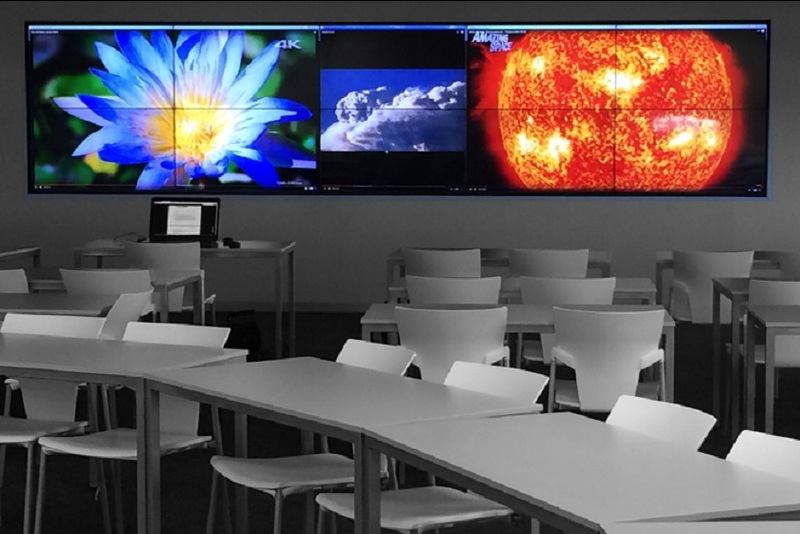What is eResearch?
24 April 2017 | Story Chido Mbambe. Photo Dr Jason van Rooyen.
In the age of big data and international collaboration, researchers require dedicated and specialised IT support. UCT eResearch is the university’s response to this changing academic landscape.
This combination of support services, which provides researchers with high-performance computing resources, has gone from strength to strength since its establishment in March 2014. It is the beginning of a national drive to ensure that researchers have the advanced IT support they require.
“Increasingly research is not conducted in isolation. It’s increasingly conducted in collaborations, which means that researchers need greater IT support to enable national and international collaboration,” says technical services director of UCT eResearch Dr Dale Peters.
She says that the aim of eResearch is to put researchers in touch with their peers across the globe.
“That’s the whole point … to accelerate research so that they don’t have to start from the beginning and run the same experiment that somebody else did last year somewhere else in the world.”
UCT eResearch is a virtual organisation that comprises services from different partners: UCT’s Information and Communication Technology Services (ICTS), the Research Office, and UCT Libraries.
ICTS provides support through cloud computing and cloud storage instead of on a local server. This gives researchers the ability to develop collaborative research settings where they can share data, computational capabilities and other resources, without having to worry about restrictions of time and space.
The Research Office contributes to the partnership by arranging the electronic research administration system (eRA) and providing communication and marketing support.
UCT Libraries contribute scholarly publishing and research data-management services to assist researchers in maintaining research integrity by ensuring that relevant data is archived, accessible and citable, so that results can be verified and data reused in future.
“Researchers are increasingly required to manage the data and store it somewhere where it will be available in 50 years’ time. That can’t happen on your desktop, and that’s really what we’re doing – moving research from the desktop into a research infrastructure, and we can help them comply with funder and publisher requirements,” says Peters.
Linking researchers globally
Essentially the services offered are for UCT researchers, but there are other universities in South Africa that are beginning to develop an interest in data intensive research activities.
A regional partnership has been established in a UCT-led consortium that was recently awarded a contract by the Department of Science and Technology to establish a Western Cape data intensive research facility, as part of the department’s National Integrated Cyber Infrastructure System (NICIS).
“We also host the African Research Cloud, which is the shared infrastructure of servers and storage capacity that UCT makes available to other South African universities. Rather than all the universities trying to deal with big data on their own, we have agreed to work in collaboration,” says Peters.
Included in the local partnerships and collaborations are North-West University, Stellenbosch University and the University of the Western Cape, among others.
eResearch Africa conference
The eResearch Africa conference is aimed at providing researchers with the platform to showcase how they are using technology resources to conduct their work and what methods they use to process their data.
“It’s an opportunity for people from other universities to come to workshops and to share the ideas of international speakers experienced in the provision of research infrastructure,” says Peters. “It’s a professional development opportunity for people around the country.”
This year’s eResearch Africa Conference will take place from 2 to 5 May. A range of research support practitioners, academic researchers and educators from varied disciplines have been invited to participate in the event.
The focus areas are data, data visualisation, data transfers, research data management and traditional areas like high-performance computing.
Data visualisation wall
UCT eResearch, in collaboration with UCT Libraries, will launch a data visualisation wall in the Hlanganani Junction in the Chancellor Oppenheimer Library at the eResearch Africa conference. The 20-million-pixel research video wall will serve as a space for collaboration and engagement for researchers.
The video-wall software allows multiple researchers to display their data, extracted information, visualisations and animations at the same time on a very large-format screen, and to use devices such as cellphones, tablets and laptops to interact with the screen displays.
 This work is licensed under a Creative Commons Attribution-NoDerivatives 4.0 International License.
This work is licensed under a Creative Commons Attribution-NoDerivatives 4.0 International License.
Please view the republishing articles page for more information.










